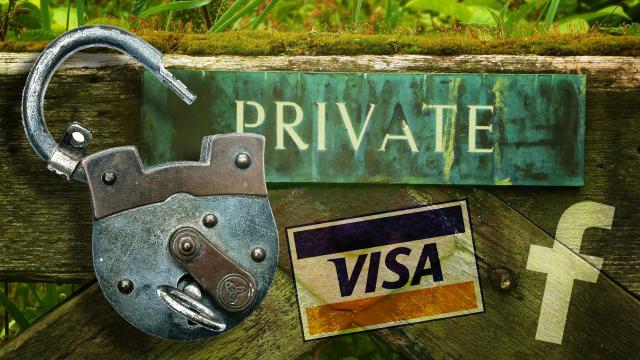Dear Lifehacker, Look, I’m not really the tinfoil hat type, but everyone keeps telling me I should care a little bit about my privacy. So I ask you: What privacy-related stuff actually affects me day to day, and what should I actually be paying attention to? Sincerely, Private I
Dear PI,
Everyone has a different opinion on this, but privacy matters in a few key ways for most of us. Let’s start first by talking about why people care about privacy to begin with, and what it really means in the online world.
Why We Care About Privacy

It seems like every week we hear about some type of invasion of privacy. Whether it’s Facebook tracking us or the NSA, someone is watching what we’re doing online at all the time. So what’s the point in caring anymore? It’s about control.
Online privacy is about the ability to control the social information you release. It means that you are aware of what information is public about you, and you can alter that information to suit your needs. Privacy isn’t about keeping things away from the public eye — it’s about choosing what the public sees. This is why we hear a lot about Facebook’s privacy settings, but not Twitter’s. On Twitter, everything is clearly public (unless your account is private), whereas privacy is a bit more obtuse on Facebook.
That said, privacy concerns are raised when the data collected by these social networks is used for ads. This happens both online and offline. Your data is worth a lot of money, and the fact they’re collecting it without you really knowing about it makes a lot of people upset. Companies make money from what you do online. If you don’t know that’s happening it’s pretty easy to see how it’s considered an invasion of privacy.
Beyond that, online privacy is a much bigger issue than keeping minor details on Facebook a secret. Your Facebook profile might include private information about your health, legal issues, finances, sexuality, religion and so much more. Even if you have your own privacy locked down, others in your social network may not, and that means information you think is private gets leaked elsewhere.
The fact is, we leave a heck of a digital trail everywhere we go and that trail can be put together to form a pretty good image of you. We’ve talked a lot about why you should care about your privacy before, and a reason to defend privacy isn’t just because you have something to hide — it’s because you probably just don’t know you want it hidden yet.
The Privacy Settings That Affect You Day to Day

All that said, we understand not everyone cares about their privacy on such a large scale. And, while we disagree, it’s true that certain things matter much more on a day to day basis.
Traditional wisdom says that if you don’t want information public, then you shouldn’t put it online. That’s certainly true, but there’s a lot of private information you have out there that you might not even realise is public. For most of us, this means what people see on social networks and our personal identifiable information that really matters — no tinfoil hat required.
Your Social Updates, Photos and Other Personal Stuff
It might sound obvious, but the main concern for most people is getting their digital persona under wraps. It’s incredibly easy to dig up information on people, especially when you’re doing a lot of stupid things and just leaving it out all out there.
For your own sake, keeping a clean online presence is essential for job hunting. Understanding the way privacy settings work is the first step to ensuring you’re not accidentally sharing that photo of you drunk at the bar.
Privacy on social networks isn’t important just for your own sake though. It’s also about your friends, family and children. Everyone is comfortable with different levels of privacy, so if you’re sharing details, photos or locations of friends, that can be pretty upsetting for some people. That’s why Facebook has privacy settings that control how you’re tagged in photos and locations. Again, this boils down to what privacy really means: the ability to control what’s shared and who it’s shared with.
Credit Cards, Addresses and Other Personally Identifiable Information
It might seem obvious, but the other main privacy concern everyone can identify with is sensitive information, such as credit cards, credit reports, addresses, health information and other similarly personal stuff.
The fact is we release a lot of this information online, and it’s incredibly easy to dig up off your hard drive, from retailers or after a data breach. Part of the issue here is security, but it’s also about privacy.
We’ve talked about ways to keep this stuff private before, but it’s out of your hands in a lot of cases. The best you can do is use incognito mode in your browser, and protect your online accounts as best you can. Security and privacy are two different things, but they’re so closely connected you need to pay attention to both. All this stuff is connected, and the information that identifies who you are can be combined together easily.
We’d argue that these are just the most obvious, basic privacy settings you should be worried about, and there’s actually a lot more out there. But this is the stuff everyone should start withe. After that, if you care about digging deeper, you can.
In the end, it’s a pretty ruthless fight to keep your information private and continue to use the internet. We’ve shown you how you can protect yourself to a point (the NSA can certainly still see exactly what you’re doing), how to browse the web privately, or just give up and delete yourself from the internet forever. Once you’re offline, the New York Times has a guide for keeping it that way if you’re interested. If you’re going to continue using the internet with the expectation of privacy, you’ll be sorely disappointed, but at the very least you can lock down the data that really matters to you.
Cheers
Lifehacker
Do you have a question you want to put to Lifehacker? Send it using our contact tab.
Pictures: Jean-Etienne Minh-Duy Poirrier, Andrew

Comments